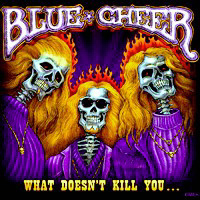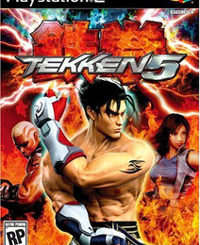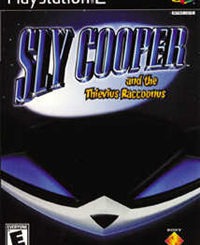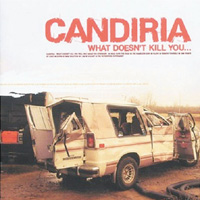 Candiria
Candiria
What Doesn’t Kill You… (Type A)
An interview with bassist Mike MacIvor
By Eric Chon
You often hear of bands on top of their game when suddenly tragedy hits. Whether it’s an excessive hedonism or an honest-to-god fluke, these bands rarely, if ever, climb back to their heights. But for Brooklyn’s Candiria, a run-in with an 18-wheeler in their touring van (prominently and proudly displayed on the cover of their latest offering) has only focused their intensity and given them fuel for their fire. Bassist Michael MacIvor talks to us about what Candiria is about, and how this near-tragedy has rekindled their passion to conquer the world, one stage at a time.
It’s hard to pin down Candiria. Words like genre or style are meaningless when people listen to your albums. So what’s Candiria all about? What’s the bottom line?
We’re rooted in rock! There are lots of influences at work here, it’s a huge mixed bag. (laughs) We find everything that fuses into this band interesting and fun, you know? Our theory, if you want to call it that, is to remain as open-minded as we can and bridge all different styles of music.
To experiment and to experience different things is so close to what the human soul is all about. It weirds me out when people segregate and separate different genres of music. When people are critical of that, to the point of not liking someone because of their taste in music! That’s crazy, man.
We want to get beyond that, to be as creative as we can and enjoy our music as much as possible regardless of labels or genres. As eclectic as you want or downright simple, you know? I think with What Doesn’t Kill You…, we showed that would be simple and melodic but still retain the chaos and technicality of our past records. I mean, there’s just so much room to play with in there…
Do you think there’s a consistent musical direction with Candiria? Of always pushing and changing? A consistent direction of inconsistency?
It’s just so hard to say. I try and make it a point never to comment on what’s next or what our new direction will be. It’s all very relevant to what we’re experiencing and what we’re doing at that moment in time. I think of Candiria as a completely organic band, you know? Always going with the now. Nothing we do is ever premeditated or precalculated. I mean, if someone told me we were going to make a record like What Doesn’t Kill You… right after we finished 300% Density I would’ve laughed my ass off! (laughs)
How has the accident influenced your music? How has it changed your perception?
It’s the biggest fuel for our desire to climb back up and get on the road. Try and get back where we feel we should’ve been two years ago. I mean, we toured consistently from 1998 to 2002 and had a two-year period where we couldn’t play. That’s a lot of time to make up, so we’re trying as hard as we can to expose ourselves to as many fans as possible. It’s tough making up for lost time.
How’ve your old fans taken to this new direction?
You have to look at us as a baby band now, you know? We consider all the kids out there as new fans, like we’re starting over completely. It’s been awhile, and the music scene has vastly changed. You know, things that were popular now aren’t, and we’re reorienting ourselves. But we’ve got a lot to offer to any fan of heavy or interesting music.
We’ve got all these different influences and sounds and are playing with such a diverse group of bands trying to get the word out. We have something to offer everyone, and the response has been overwhelming. I think if a band really performs well and puts on a passionate, honest show, that carries over to the audience. I really think we win people over with our live performance.
How has the accident affected your life outside of music?
It’s been really hard for us. Our source of income was taken away for awhile, so living hasn’t really been easy. We got hit really hard, so there’ve been all sorts of different surgeries for each of us. We’re dealing with pain on a daily basis. Our performances require a lot out of us physically, and sometimes it just hurts, you know? (laughs) We’re definitely living with pain now. But, you know, everyone lives through pain – old people, young people, everyone. You just gotta do what ya gotta do. Not everyone is as lucky as we are, you know? We were given a second chance to conquer the world! (laughs)
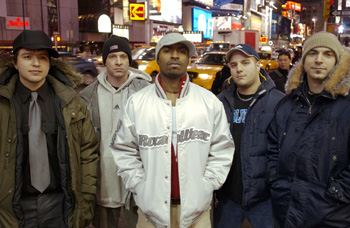 What were your musical influences while recording What Doesn’t Kill You…?
What were your musical influences while recording What Doesn’t Kill You…?
Honestly, for the most part, we’re not listening to anybody else’s music that’s similar to ours. The majority of the music we’ve been listening to has been ’60s and ’70s ska and dub reggae! (laughs) We have a friend who works with Trojan Records, and he just hooked up our drummer with boxes and boxes of old school rocksteady and dub music. It’s been awesome!
Well, ska and rocksteady are heavily rhythm and beat-oriented. I can certainly see the influence on the new record. It’s cool that metal bands will actively avoid listening to metal when writing new material and try and draw from elsewhere.
Listening to the same stuff sort of puts you in a box, maybe? I don’t know, maybe that’s just us. We try to incorporate elements from other styles of music and adapt them to our own style, rather than adapt our style to anything else.
Oh, we did listen a lot to this one rock band: The Upwelling. They’re an unsigned band that’s kind of in the vein of Coldplay. I’m not too keen on Coldplay, but definitely on The Upwelling. They’re not going to stay unsigned for long, I bet. They’re just a really cool band.
How does it feel to be back on tour again?
It feels great! It’s what we live to do really. (laughs) It’s been so great to play a bunch of different markets we’ve never gotten to before. That dynamic between the audience and the band, there’s nothing like it.
Are there any bands you’re itching to play with?
There are tons of bands I’d love to play with. The Dillinger Escape Plan we’ve toured with before, but going again would be a blast. Isis, we’d love to tour with them again. Mastodon would be so great. You know, we really just want to play with bands that sound unique. Deftones, Tool; both those bands are amazing. Nobody sounds like them! It’d be really wicked to do shows with the Blood Brothers or Mars Volta, oh man, would that be cool!
Bands that buck “genre” tags…
Yeah, a very eclectic group of bands. We’ve toured with Clutch, Kitty, Cryptopsy, Bad Brains, Shadows Fall: Bands with musical styles all over the place! It’s hard to pin down their genre because they’re all so unique. They’re all going out and doing their own thing, and that’s what we’re all about.
Has any new music caught your ear since you’ve been on the road?
Well, I don’t really keep my ear to the ground on this stuff, but I really dig all the bands mentioned above. Engine Down, Upwelling again, uh, even My Chemical Romance! (laughs) I think those guys are really cool, but I’m sure people may give me some crap for that! (laughs)
My current favorite records: the new Mastodon is fantastic, Dillinger’s Miss Machine is great, and the new Killswitch.
How did you decide that this, playing music and living your life on the road, was what you wanted to do?
When I was real young, I wanted to make music. I thought it was the coolest thing I could do with my life. To pour myself into being creative, you know? I never really decided that I wanted to live on the road, I just ended up there! (laughs) It was never a conscious decision. You could almost say I was shanghai’d by the road! (laughs)
Okay, a few off-the-wall questions for ya: If you had total control of the music industry, what would you change? What would you do differently?
I’d really change the way artists are treated. You know, some guys are treated really well, while others are treated like crap. You have these kids and they’re so desperate to get out there, to get signed, and they sign some contract and get stuck in a rut. They’re not happy, and they’re not in control.
That’s the main thing: I’d like to see artists have a more active role in the business of what they’re doing. I’m so happy to see smaller, artist-run labels out there. It’s really healthy for this monster of a music industry. I dunno, maybe one day, smaller, indie labels can topple the giant and we can start over again; recycle the industry. We need to focus on more artist development and building things up instead of blowing millions on crap bands that live on marketing. Stop focusing solely on record sales and think about the music we’re making.
I’m a big fan of Ferret Records and how they do things. They put out a lot of different stuff – 12 Tribes, the first Killswitch Engage album, The Bronx – all of it good stuff.
How do you feel about online distribution? The proliferation of mp3s and such?
I’d like to think the real fans will support us. Maybe download a few tracks, decide they like it, and then buy it. But honestly, we don’t make much money from album sales, so I don’t really mind. If they download the album and discover they like us, then come to our shows and pick up something from the merch table, that’s where most bands make their living.
(www.candiriamusic.com)

